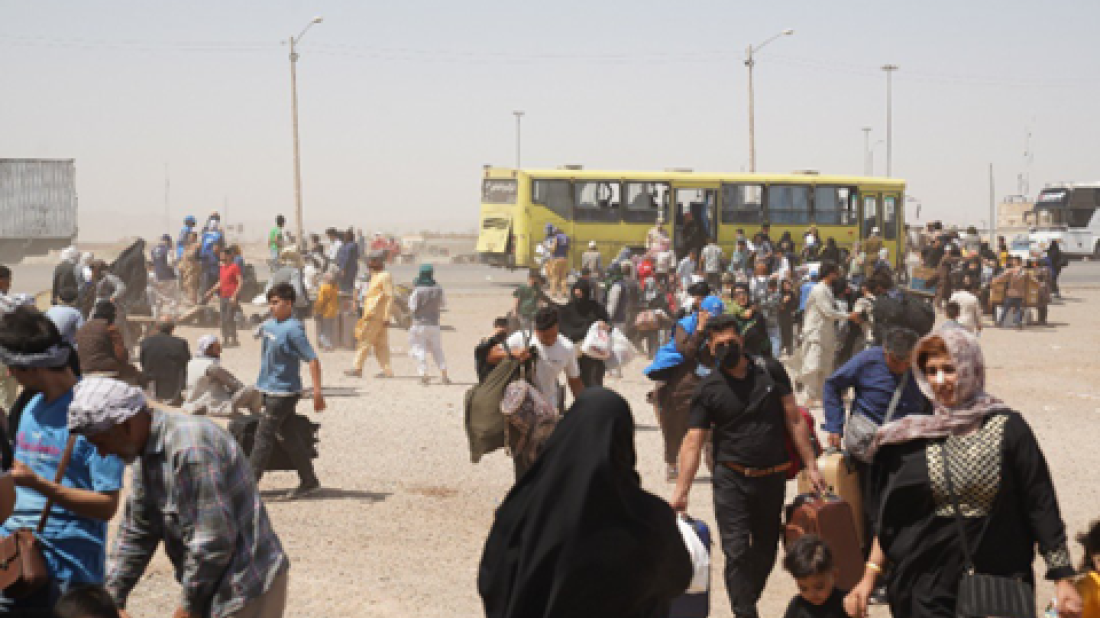'Productive' first day of peace talks in Abu Dhai between Ukraine, Russia and U.S.
Ukrainian and Russian officials wrapped up a "productive" first day of new U.S.-brokered talks in Abu Dhabi, Kyiv's lead negotiator said on Wednesday ...

Afghanistan’s Deputy Prime Minister for Administrative Affairs met with senior migration officials in Kabul to address the escalating return of Afghan refugees from neighbouring countries, amid Pakistan’s deadline for registered refugees to leave by the end of August.
Mawlavi Abdul Salam Hanafi met with Mohammed Abdiker, Chief of Staff at the International Organization for Migration (IOM), to explore ways of expanding humanitarian cooperation and improving assistance for returnees.
According to the Afghan government’s media office, both sides emphasised the importance of long-term coordination and international support to manage the growing influx of returnees and the strain on local infrastructure.
The United Nations High Commissioner for Refugees (UNHCR) has reported that 2.1 million Afghans have returned from Iran and Pakistan since 1 January 2025, with more than 1.4 million returning from Iran and over 303,000 from Pakistan between April and the end of July.
UNHCR stated that many Afghan returnees from Iran reported discrimination, harassment and unpaid wages, raising concerns about reintegration and protection upon return.
Meanwhile, Pakistan has given registered Afghan refugees until 31 August to leave the country. According to UNHCR, around 1.5 million Afghan refugees are currently registered in Pakistan under the Proof of Registration (PoR) scheme. Their registration cards expired at the end of June 2025, leaving them at risk of deportation.
The IOM has not released a statement following the meeting, but it has previously highlighted the urgent need for sustainable reintegration programmes and increased funding for Afghanistan’s humanitarian response.
Aid organisations have warned that the rapid increase in returns is placing additional pressure on already fragile public services. According to UN data, more than 23 million people in Afghanistan are in need of humanitarian assistance in 2025.
Cuba’s Deputy Foreign Minister Carlos Fernández de Cossío has denied that Havana and Washington have entered formal negotiations, countering recent assertions by U.S. President Donald Trump, while saying the island is open to dialogue under certain conditions.
Talks with the U.S. should be pursued to secure national interests as long as "threats and unreasonable expectations" are avoided, President Masoud Pezeshkian posted on X on Tuesday (3 February).
Mexico said it will stop sending oil to Cuba as U.S. President Donald Trump ramped up pressure on the Caribbean nation.
Ukrainian President Volodymyr Zelenskyy accused Russia on Tuesday (3 February) of exploiting a U.S.-backed energy ceasefire to stockpile weapons and launch large-scale drone and missile attacks on Ukraine ahead of peace talks.
Paris prosecutors have summoned X chairman Elon Musk and former chief executive Linda Yaccarino for questioning in April as part of their probe into the X social media network, they said on Tuesday.
Ukrainian and Russian officials wrapped up a "productive" first day of new U.S.-brokered talks in Abu Dhabi, Kyiv's lead negotiator said on Wednesday (4 February).
Nearly 200 people were killed when armed men launched coordinated attacks on remote villages in western and northern Nigeria, authorities and residents said on Wednesday (4 February). Officials described the assaults as among the deadliest this year, amid the country’s worsening security crisis.
The United States and Argentina have signed a framework agreement to strengthen cooperation on critical minerals on Thursday, reaffirming a shared commitment to building secure, resilient and competitive supply chains.
Russia said on Wednesday that the parties to the New START nuclear arms control treaty are no longer bound by its obligations or related declarations, marking a further erosion of the last remaining legally binding framework limiting U.S. and Russian strategic nuclear forces.
Milan prosecutors have placed an elderly Italian man under investigation over allegations that foreigners paid to shoot at civilians during the 1990s siege of Sarajevo, sources with direct knowledge of the case said on Wednesday.
You can download the AnewZ application from Play Store and the App Store.

What is your opinion on this topic?
Leave the first comment